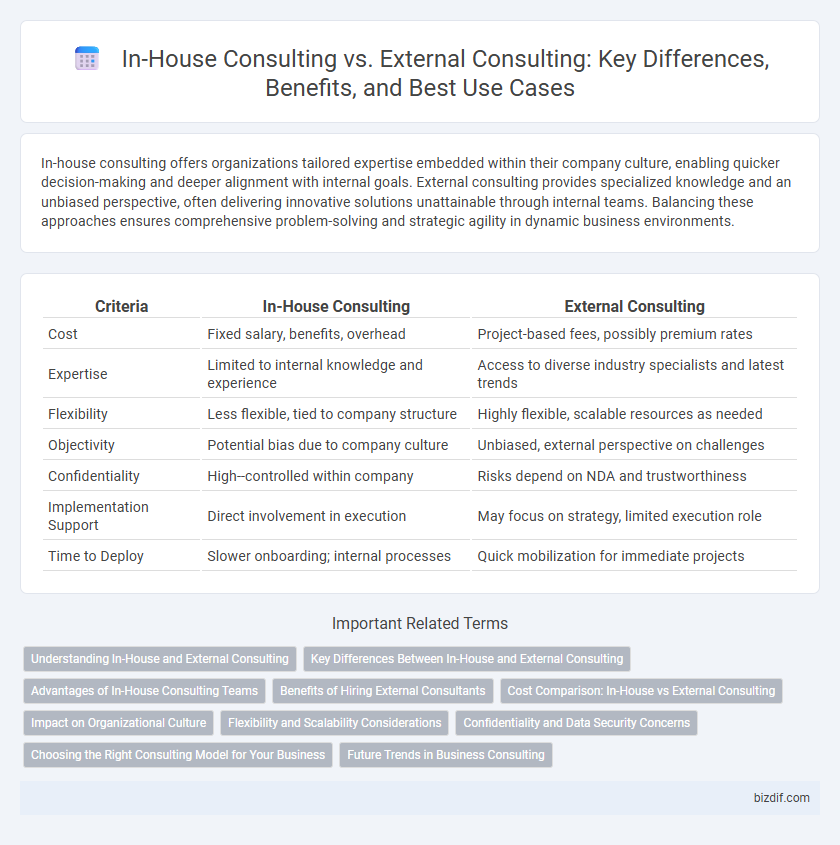In-house consulting offers organizations tailored expertise embedded within their company culture, enabling quicker decision-making and deeper alignment with internal goals. External consulting provides specialized knowledge and an unbiased perspective, often delivering innovative solutions unattainable through internal teams. Balancing these approaches ensures comprehensive problem-solving and strategic agility in dynamic business environments.
Table of Comparison
| Criteria | In-House Consulting | External Consulting |
|---|---|---|
| Cost | Fixed salary, benefits, overhead | Project-based fees, possibly premium rates |
| Expertise | Limited to internal knowledge and experience | Access to diverse industry specialists and latest trends |
| Flexibility | Less flexible, tied to company structure | Highly flexible, scalable resources as needed |
| Objectivity | Potential bias due to company culture | Unbiased, external perspective on challenges |
| Confidentiality | High--controlled within company | Risks depend on NDA and trustworthiness |
| Implementation Support | Direct involvement in execution | May focus on strategy, limited execution role |
| Time to Deploy | Slower onboarding; internal processes | Quick mobilization for immediate projects |
Understanding In-House and External Consulting
In-house consulting leverages internal expertise to address company-specific challenges with deep organizational insight and immediate availability, enhancing alignment with corporate culture and strategic goals. External consulting provides specialized skills and unbiased perspectives from industry experts, facilitating innovation and best practice implementation across various business sectors. Both approaches offer distinct advantages, with in-house consulting promoting continuity and external consulting delivering diverse, cutting-edge solutions tailored to complex projects.
Key Differences Between In-House and External Consulting
In-house consulting offers deep organizational insight and alignment with company culture, leading to tailored, continuous support for strategic initiatives. External consulting provides specialized expertise and objectivity, enabling access to industry best practices and innovative solutions without internal bias. Cost efficiency, project scope, and flexibility significantly differ, with in-house teams favoring long-term involvement while external consultants excel in short-term, high-impact engagements.
Advantages of In-House Consulting Teams
In-house consulting teams offer unparalleled advantages such as deep organizational knowledge, enhanced collaboration, and greater alignment with company culture and strategic goals. Their continuous presence fosters quicker decision-making and agile problem-solving tailored specifically to internal processes. Cost efficiency is another key benefit, as in-house consultants reduce reliance on costly external services and minimize onboarding time.
Benefits of Hiring External Consultants
Hiring external consultants provides access to specialized expertise and industry best practices that may not be available in-house, enabling organizations to solve complex problems efficiently. External consultants offer objective, unbiased perspectives that help uncover hidden opportunities and mitigate risks. Their flexible engagement model allows companies to scale resources based on project needs without long-term commitments.
Cost Comparison: In-House vs External Consulting
In-house consulting typically incurs fixed costs related to salaries, benefits, and ongoing training, making it a more predictable but potentially higher long-term expense. External consulting involves variable costs, often based on project scope and duration, which can lead to higher immediate fees but greater flexibility and access to specialized expertise. Organizations must balance the upfront investments of in-house teams against the scalable, project-based fees of external consultants to determine cost-effectiveness aligned with their strategic needs.
Impact on Organizational Culture
In-house consulting fosters a deep understanding of organizational values, promoting a cohesive culture aligned with long-term strategic goals. External consulting introduces diverse perspectives and specialized expertise, often accelerating change but risking cultural disruption if not managed carefully. Balancing internal knowledge with external insights enhances adaptability while preserving core cultural integrity.
Flexibility and Scalability Considerations
In-house consulting offers greater flexibility by enabling direct alignment with company culture and immediate access to internal resources, facilitating tailored solutions that evolve with organizational needs. External consulting provides superior scalability, allowing organizations to rapidly deploy specialized expertise and scale project teams based on fluctuating demands without long-term staffing commitments. Balancing in-house adaptability with the expansive reach of external consultants supports optimized resource management and project execution in dynamic business environments.
Confidentiality and Data Security Concerns
In-house consulting offers enhanced confidentiality and data security by restricting sensitive information access to internal teams bound by company policies and cultural understanding. External consulting poses potential risks due to data exposure across multiple organizations, necessitating rigorous contractual agreements and cybersecurity protocols to mitigate breaches. Prioritizing encryption, non-disclosure agreements (NDAs), and compliance with data protection regulations like GDPR ensures robust protection regardless of consultancy type.
Choosing the Right Consulting Model for Your Business
Selecting the right consulting model depends on factors such as project scope, expertise required, budget constraints, and organizational culture. In-house consulting offers deep institutional knowledge and seamless integration, while external consulting provides specialized skills and unbiased perspectives. Balancing these advantages ensures optimal value and strategic alignment for business objectives.
Future Trends in Business Consulting
In-house consulting teams are increasingly leveraging advanced data analytics and AI to provide real-time, customized strategic insights that align closely with company culture and long-term objectives. External consulting firms are evolving by integrating digital transformation services and specialized expertise in emerging technologies to address complex, industry-specific challenges. The convergence of hybrid consulting models is expected to optimize cost-efficiency and agility, enabling businesses to rapidly adapt to market disruptions and innovation cycles.
In-House Consulting vs External Consulting Infographic

 bizdif.com
bizdif.com